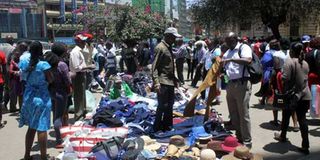Unregulated hawking fuelling insecurity

Hawkers on Moi Avenue, Nairobi, in this picture taken on October 4, 2017. PHOTO | ANTHONY OMUYA | NATION MEDIA GROUP
What you need to know:
- These two places serve both the commoner and the elite who buy vegetables and flowers.
- They will also control the numbers and prevent infiltration by criminals.
All the big cities in the world have a form of hawking. In Kenya, unregulated street hawking is one of the biggest challenges county governments are facing.
Banning or eliminating it is almost impossible. There are two main reasons why urban hawking thrives.
One is the shortage of formal employment. Hawking gives an alternative to the unemployed and secondly, hawking is a source of living for half of the population in urban areas.
Regulating hawking is a big challenge since the poor form a big voting block and politicians fear to enforce and regulate it.
HAWKING
Indeed, hawking is here to stay but what is important is regulation and management. Uncontrolled hawking is a recipe for a concoction of socio-economic challenges.
The immediate major challenge is insecurity. Uncontrolled hawking breeds crime.
This is because of the anarchy from the practice where people from the slums and adjacent areas to the city engage in hawking.
Criminals take advantage of this to conceal themselves. If regulated, hawking is quite in order. A good example is the City Park, Nairobi, hawkers’ stalls along Limuru Road and on Argwings Kodhek road opposite the Nairobi Hospital.
These two places serve both the commoner and the elite who buy vegetables and flowers.
If properly controlled, hawkers and shoppers will both benefit from increased urban security. A majority of the hawkers are genuinely trying to earn a living.
MUGGERS
A number of roads in Nairobi are safer during the day than at night. The reason is that during daytime, hawkers deter any attempt by muggers or street urchins to steal from motorists to protect their business and reputation.
Muggers caught by hawkers face dire consequences, including the risk of being lynched. This is proof of how genuine hawking enhances security.
It will be important for the authorities to have a code of regulation for hawkers, focusing on what they should sell, how and what will be the obligations from their side.
The county governments’ obligation is to regulate and stop harassment while the hawkers will take responsibility for cleanliness and security of their customers.
They will also control the numbers and prevent infiltration by criminals.
Mapping of hawking zones and the need to cluster into groups and register themselves will assist the county governments.
Currently, hawking has made conventional business very difficult to carry out. Central business areas in most towns are now filthy, noisy and prone to petty crimes such as pick- pocketing and mugging.
BIG LOANS
Prime property is slowly losing value due to unregulated hawking. Today, most areas of Nairobi and other big towns have become quite unsafe due to the widespread unregulated hawking that has been infiltrated by criminals masquerading as hawkers.
The enforcement of standards for hawking can be escalated to the formation of saccos so that a hawker can even graduate to the next level of business, hence accessing big loans from banks.
Today, most hawking is done under fear of corrupt county askaris who frequently confiscate/rob hawkers of their merchandise and in some cases, lock them up in cells for extortion.
Regulated hawking is not a nuisance. Anyone who has visited some of the most developed cities such as Washington DC, Taipei and even New York will come across hawkers.
The hawking in our towns is chaotic and has been associated with all the bad things, and, in particular, crime, filth and environmental pollution.
The regulation of hawking is long overdue and will be to the advantage of the traders and the authorities.
Mr Mbarak is a retired military officer and a certified security management professional. [email protected]





